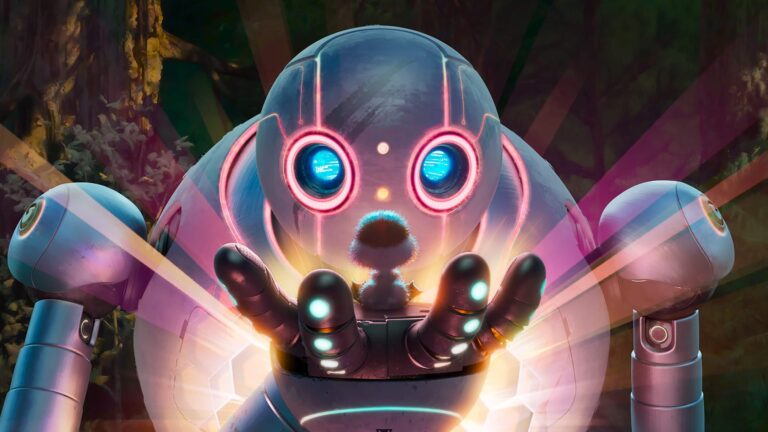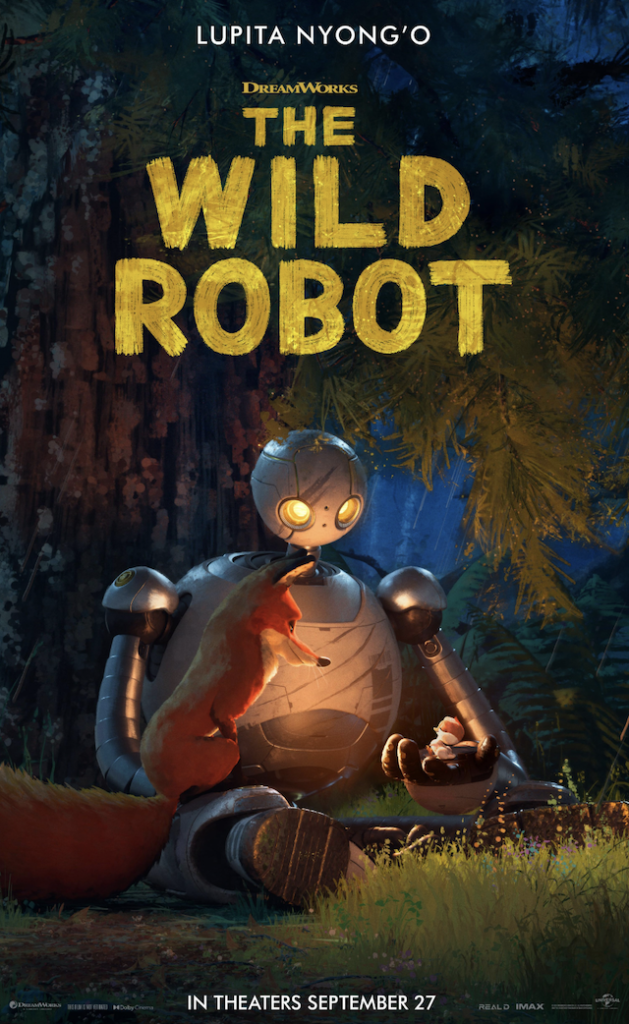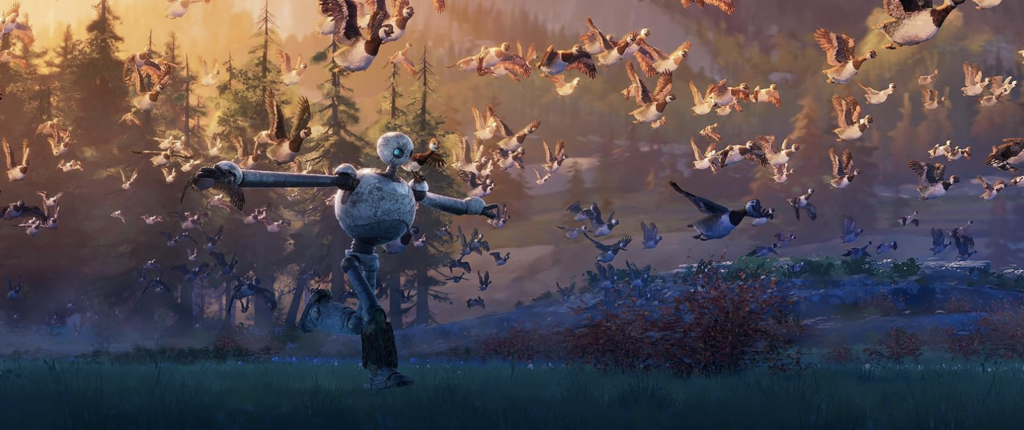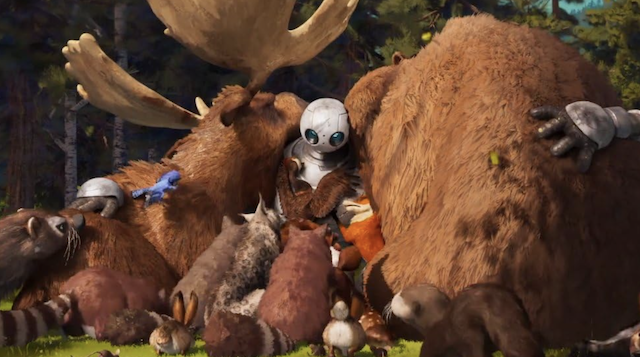
@Courtesy of DreamWorks Animation

Q: The Wild Robot marks your return to directing an animated feature after making 2020’s live-action The Call of the Wild. How did the experience of directing that film change your approach to your first animated feature in 11 years?
Chris Sanders: The immediacy of the collaboration was different. Animation develops slowly, over such a long period, you’re there on the day you’ve got to get everything. It’s all about collaboration, particularly with the actors. It’s different, it’s more immediate, you only have the day to get everything, there’s a lot more interaction, in the best way possible.
Q: How did you express such a wide array of emotions only through your voice?
Lupita Nyong’o: I had an incredible partner in Chris. I asked him why he thought of me for the role of Roz and he mentioned that he liked the warmth of my voice. So we knew that we were going to end up with a Roz that sounded more like me, to kind of depict that evolution she’s gone through, and then we reverse-engineered. I was inspired by the automated voices of Alexa, and Siri.
What was similar in all of them was the optimistic brightness. So after a lot of trial and error, we had many versions of Roz. That’s the beauty of doing it over two and a half years: as the script develops, so does the voice. In the end, we ended up with that programmed optimism to start her off but we had these moments in the script when her voice is evolving to show how she’s adapting to her new environment. It was wonderful to have such a supportive and insightful partner in Chris.
Q: The Wild Robot is the first score you have done for an animated film. What was the fundamental difference between scoring an animated film versus a live-action one? Did you have any inspirations when it came to composing the score?
Chris Bowers: I started this film shortly after I became a dad. My daughter was only five months old when we had our first meeting. By the time I was finishing, she was in the terrible twos. It’s a very different experience. So much of the emotion and the story that’s so palpable and voluntary brings up these visceral emotions for me, it also mirrors so many things I was already thinking about in my own life. One sequence in particular I think about is the migration sequence.
I hadn’t even thought of the depth of that experience Roz and Brigh Bill are going through, Chris reminded me of what that experience might be with my daughter. I remember going back after that conversation with him and writing that piece of music that came out of me very naturally because of how much emotion was on top of my mind. Inspiration is a lot of my personal experiences. Having to rely so much on Chris’s guidance as a director to understand what I was scoring, to look at the concept art to realize what this was going to look like in terms of color and imagery, and to use my imagination. All of that was such an emotional process for me.

@Courtesy of DreamWorks Animation
Q: What would you say is the most important message you would like audiences to take away from experiencing the film?
Chris Sanders: The idea that at some point we have to change our programming to accomplish something. We’re all creatures of habit. We hate change. Sometimes we’re afraid that if we change our programming, we’re going to lose ourselves somehow. You’re not going to, you’re going to become a more dimensional being, and it’s going to be okay. That was something that was built into the book by Peter Brown that we identified as a core theme in the story.
Lupita Nyong’o: I like the message that kindness is a force. It can be considered a vulnerability, while in this film we show how Roz’s journey shows how it is a force to reckon with.
Chris Bowers: Maybe add to that thanking the people who have sacrificed for us, whether it’s our mothers or whomever else is playing that role. There’s so much that they are doing for us to be able to thrive in this world, we need to remember to thank them and say I love you when it makes sense.
Q: How was the recording experience, and did you learn any lessons in the voice booth?
Lupita Nyong’o: I had a lot of fun. Every time we got to a recording session, it would start with me giving notes on the new pages. Chris was very receptive to that, it was awesome to be able to share a thought about struggling with something on the page, sharing it with Chris, and then he would have solved the problem. It was a wonderful symbiotic relationship we had working on this movie, I always felt valued, and seeing the final product I swelled with gratitude for having been a part of it, seeing my fingerprints on it, seeing what everybody else brought to it: that was amazing.
Finding the right creative chemistry is so important. I also learned to go easy on myself because I had a vocal accident when I was working on the earlier part of Roz, that voice was quite vocally athletic for me and I injured myself, I had to stay silent for three months. So I learned a very important lesson there to pay attention to my limitations.
Q: How did you visualize Roz’s journey from being a shipwrecked robot to becoming a vital part of the island’s ecosystem? What were your key considerations in designing the island and its inhabitants?
Chris Sanders: I wanted to make sure that we built Roz with a lot of articulation. We knew that she had to be like a humanoid because of the book and the role that she played in the story, but we also wanted her to be surprising and interesting, we wanted to give the animators opportunities to move her in interesting ways. At every turn, they surprised me with what they were able to do with her rig. I was very insistent that the island had to be uneven, and that we never make things convenient for Roz. Especially in the beginning, we wanted her to bend and duck, we wanted to be sure that the audience understood very clearly this was not where she was supposed to be, but she didn’t get it. It’s one of the fun things about it. The engineered optimism that Lupita was talking about.

@Courtesy of DreamWorks Animation
Q: Did you recall any childhood memories while making this film for inspiration? If so, what were they?
Chris Bowers: I thought a lot about when I first realized the power of music to help tell a story, which was in early animation. As a kid I just watched cartoons most of the time, they were mostly those cartoons that didn’t have any dialogue: Tom and Jerry or the early Mickey Mouse cartoons or Looney Tunes. You’re getting so much from the physical gestures of the characters and the music alone, that you’re not even thinking about whether or not there should be dialogue, it’s just all very clear emotionally. Chris and I talked a lot about how the music had to be able to lean on that and have moments where we could take the dialogue away. I wanted to pay homage to those great composers who were able to make us feel so many different things with just music.
Lupita Nyong’o: Roz is a very sophisticated robot, but when she lands on this island she’s like a child, That’s what makes her such a great character, her fresh eyes and naivete on what life on a wild island can be like. The innocence of children is something that I thought of. Roz has that sort of literal way of looking at the world because she’s brand new, keeping that innocence was my primary goal.
If you like the articles, share your thoughts below!
Check out more of Adriano’s articles.
Here’s the trailer for The Wild Robot:

